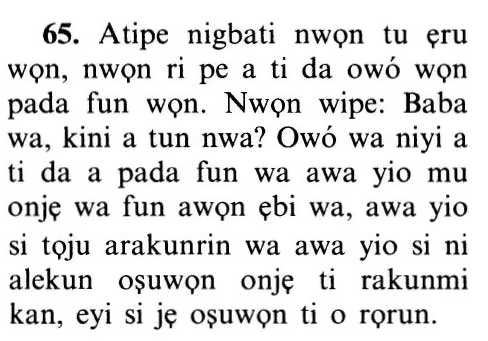12vs65
Select any filter and click on Go! to see results
وَلَمَّا فَتَحُواْ مَتَاعَهُمْ وَجَدُواْ بِضَاعَتَهُمْ رُدَّتْ إِلَيْهِمْ قَالُواْ يَا أَبَانَا مَا نَبْغِي هَـذِهِ بِضَاعَتُنَا رُدَّتْ إِلَيْنَا وَنَمِيرُ أَهْلَنَا وَنَحْفَظُ أَخَانَا وَنَزْدَادُ كَيْلَ بَعِيرٍ ذَلِكَ كَيْلٌ يَسِيرٌ
Walamma fatahoo mataAAahum wajadoo bidaAAatahum ruddat ilayhim qaloo ya abana ma nabghee hathihi bidaAAatuna ruddat ilayna wanameeru ahlana wanahfathu akhana wanazdadu kayla baAAeerin thalika kaylun yaseerun
Index Terms
Click to play
Yoruba Translation

Hausa Translation
Kuma a lõkacin da suka bũɗe kãyansu, suka sãmi hajjarsu an mayar musu da ita, suka ce: "Yã bãbanmu! Ba mu zãlunci! Wannan hajjarmu ce an mayar mana da ita, kuma mu nħmo wa iyalinmu abinci, kuma mu kiyãye ɗan´uwanmu, kuma mu ƙãra awon kãyan rãƙumi guda, wancan awo ne mai sauki."
Asbabu n-Nuzuul (Occasions of Revelation)
They find Their Money returned to Their Bags
Allah says
وَلَمَّا فَتَحُواْ مَتَاعَهُمْ وَجَدُواْ بِضَاعَتَهُمْ رُدَّتْ إِلَيْهِمْ ...
And when they opened their bags, they found their money had been returned to them.
Allah says, when Yusuf's brothers opened their bags, they found their merchandise inside them, for Yusuf had ordered his servants to return it to their bags. When they found their merchandise in their bags,
... قَالُواْ يَا أَبَانَا مَا نَبْغِي ...
They said: "O our father! What (more) can we desire...'',
what more can we ask for,
... هَـذِهِ بِضَاعَتُنَا رُدَّتْ إِلَيْنَا ...
This, our money has been returned to us;
Qatadah commented (that they said),
"What more can we ask for, our merchandise was returned to us and the Aziz has given us the sufficient load we wanted.''
They said next,
... وَنَمِيرُ أَهْلَنَا ...
so we shall get (more) food for our family,
`if you send our brother with us the next time we go to buy food for our family,'
... وَنَحْفَظُ أَخَانَا وَنَزْدَادُ كَيْلَ بَعِيرٍ ...
and we shall guard our brother and add one more measure of a camel's load.
since Yusuf, peace be upon him, gave each man a camel's load of corn.
... ذَلِكَ كَيْلٌ يَسِيرٌ ﴿٦٥﴾
This quantity is easy (for the king to give).
They said these words to make their case more appealing, saying that taking their brother with them is worth this gain,
يقول تعالى ولما فتح إخوة يوسف متاعهم وجدوا بضاعتهم ردت إليهم وهي التي كان أمر يوسف فتيانه بوضعها في رحالهم فلما وجدوها في متاعهم " قالوا يا أبانا ما نبغي " أي ماذا نريد" هذه بضاعتنا ردت إلينا " كما قال قتادة : ما نبغي وراء هذا إن بضاعتنا ردت إلينا وقد أوفى لنا الكيل " ونمير أهلنا " أي إذا أرسلت أخانا معنا نأتي بالميرة إلى أهلنا " ونحفظ أخانا ونزداد كيل بعير " وذلك أن يوسف عليه السلام كان يعطي كل رجل حمل بعير وقال مجاهد حمل حمار وقد يسمى في بعض اللغات بعيرا كذا قال " ذلك كيل يسير " هذا من تمام الكلام وتحسينه أي أن هذا يسير في مقابلة أخذ أخيهم ما يعدل هذا .
"ولما فتحوا متاعهم وجدوا بضاعتهم ردت إليهم قالوا يا أبانا ما نبغي" ما استفهامية أي أي شيء نطلب من إكرام الملك أعظم من هذا وقرئ بالفوقانية خطابا ليعقوب وكانوا ذكروا له إكراما لهم "هذه بضاعتنا ردت إلينا ونمير أهلنا" نأتي بالميرة لهم وهي الطعام "ونحفظ أخانا ونزداد كيل بعير" لأخينا "ذلك كيل يسير" سهل على الملك لسخائه
الآية ليس فيها معنى يشكل .
I'raab - grammatical analysis of the Qur'an
«وَلَمَّا» الواو استئنافية ولما حينية.
«فَتَحُوا مَتاعَهُمْ» ماض وفاعله ومفعوله والجملة مضاف إليه محلها الجر.
«وَجَدُوا بِضاعَتَهُمْ» ماض وفاعله ومفعوله الأول والجملة لا محل لها لأنها جواب لما غير الجازمة.
«رُدَّتْ» ماض مبني للمجهول والتاء للتأنيث ونائب الفاعل ضمير مستتر والجملة في محل نصب مفعول وجدوا الثاني.
«إِلَيْهِمْ» متعلقان بردت.
«قالُوا» الجملة مستأنفة.
«يا» للنداء.
«أَبانا» منادى مضاف منصوب بالألف لأنه من الأسماء الخمسة ونا مضاف إليه والجملة مقول القول.
«ما» نافية.
«نَبْغِي» مضارع مرفوع بالضمة المقدرة على الياء للثقل والفاعل مستتر تقديره نحن.
«هذِهِ» الها للتنبيه وذه اسم إشارة في محل رفع مبتدأ.
«بِضاعَتُنا» خبر ونا مضاف إليه والجملة مقول القول أو مستأنفة.
«رُدَّتْ» ماض مبني للمجهول ونائب الفاعل مستتر والتاء للتأنيث.
«إِلَيْنا» متعلقان بردت والجملة حالية أو مستأنفة.
«وَنَمِيرُ أَهْلَنا» مضارع ومفعوله وفاعله مستتر والجملة معطوفة على جملة محذوفة أي لنستعين بها ونمير.
«وَنَحْفَظُ أَخانا» الجملة معطوفة وإعرابها كسابقتها.
«وَنَزْدادُ كَيْلَ» إعرابها كسابقتها.
«بَعِيرٍ» مضاف إليه.
«ذلِكَ» اسم إشارة مبتدأ واللام للبعد والكاف للخطاب.
«كَيْلَ» خبره.
«يَسِيرٌ» صفة كيل والجملة مستأنفة.
